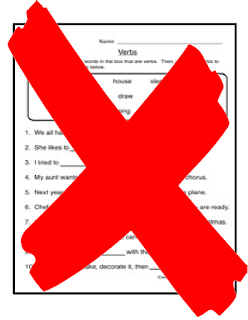Readicide by Kelly
Gallagher
OMG! I threw out morning work. I've never told anyone, I have not even said it out loud, but
after reading Readicide, I know it
was the right thing to do.
In the first chapter of Readicide,
Kelly Gallagher talks about how standardized testing has effected reading in
our schools, and the fact that the struggling readers are the most affected. I
teach in a Title 1 school, those struggling readers are my students.
I wanted to read Readicide
by Kelly Gallagher when it was published a few years ago. Instead readicide was happening in
my life. I was changing my resources to incorporate the standards. My district
was moving to a basil reading program, and test prep was all the buzz. So I
spent the summer planning, creating resources and making test prep the focus.
What happened? I hated it, and the students hated it. One student even said, “Where
is the fun work and the centers.” Wow that hit home.
So I needed to regroup. Ugh, what to do? We were 3 weeks
into school and everyone was stressed. I needed to make a change and the sooner
the better. We had a class meeting, what the students were communicating to me
was they hated reading the same the stories in the basil program over and over
again and they hated the worksheets. So
what could I change? I was pulling worksheets from the reading program as
morning work. OK, I could change that.
I quickly decided to throw out morning work. We would use
the time to read novels. I had packed away novels, you know, the novels that we
were getting rid of because now we had this great new reading program. But they
were packed away. I wanted to start now! So I decided to let the students have
a free read time. They could pick any book they wanted and read. Just read,
recreational reading, no work sheets, no test, no book reports. It would give
me time to regroup.
This has really worked for me. We change our book every
month. I still use free read, but I also have the class reading the same book. We
have our special rotation, art, music, PE, etc., first thing in the morning. We
have 15 minutes before they leave for their special rotation. One day a week we
have 45 minutes. It is on this day that we discuss the book we are reading. We
do some of the fun activities to go along with the book. When we have free
read, students can share what they are reading or I conference with them. I
love these conferences. I learn so much.
Here is a fun book your students might like:





































